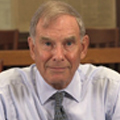
Trump and Trade
OCP Policy Center, Rabat
While the first months of 2017 in Morocco were characterized by the country’s historic diplomatic feat in re-joining the African Union, and its positive willingness of integrating the Economic Community of Western African States (ECOWAS), it is safe to say that the atmosphere was quite different in the Northern hemisphere. For both the European Union and the US, 2016 has proven to be a grim year, particularly in light of the populist wave that swept through the West. This has led the UK to opt for Brexit, a situation that has come as a surprise to the international community, and Americans to vote for a businessman as their 45th president. Donald J. Trump, the said businessman, has no previous political experience, and ran a controversial campaign that places protectionism at the heart of his economic strategy. This, in conjunction with the general leitmotif of making America great again, will make for a dangerous rollercoaster ride in the land of uncertainty.
Donald Trump has been calling for several sovereign measures such as “Buying American” and “Hiring American”, in support of his “America First” strategy. As the Trump administration considers that the U.S. has been harmed by poor trade deals, the country has not only withdrawn from the Trans Pacific Partnership, a deal that took years of hard negotiations to come about, but is also looking to renegotiate the NAFTA, a free trade treaty that the U.S. could quit with just a six month notice without consulting Congress.
In addition to that, companies that “took jobs away from America” and trade partners that behaved “unfairly” are threatened by substantial tariffs and tax raises. As a consequence to these threats, some major industrial companies have already promised to reinvest massively in the U.S. territory. However, in a globalized world, where supply chains are complex and where the manufacturing process transcends state borders, the protectionist strategy of Donald Trump might have, in the long term, the opposite effect and might make recession great again instead of making America great again.
In order to understand the implications of the new American protectionist policy, OCP Policy Center will be holding, on March 27, a talk with Dr. Theodore Moran, Fellow at the Peterson Institute for International Economics. During this event Dr Moran will address the following issues, and lead a discussion of the implications for developed and developing countries
How might old-fashioned tariffs affect globalized supply chains?
Will the approach of border-tax proposals shift jobs back to the US?
What are the implications for Developed and Developing countries?
Keep me informed
-

Theodore H. Moran
Theodore H. Moran holds the Marcus Wallenberg Chair at the School of Foreign Service, Georgetown University, where he teaches and conducts research at the intersection of international economics, business, foreign affairs, and public policy. Dr. Moran is founder of the Landegger Program in International Business Diplomacy, and serves as Director in providing courses on international business-government relations and negotiations to some 600 undergraduate and graduate students each year.
His recent books include Foreign Direct Investment in the United States: Benefits, Suspicions, and Risks with Special Attention to FDI from China (with Lindsay Oldenski, Peterson Institute for International Economics, 2013), Foreign Direct Investment and Development: Launching a Second Generation of Policy Research: Avoiding the Mistakes of the First, Reevaluating Policies for Developed and Developing Countries (Peterson Institute for International Economics, 2011).
Dr. Moran is a consultant to multinational agencies and governments on strategies to use foreign direct investment for development, to foster supply chain expansion, and to promote backward linkages via local vendor development and certification programs. He is advisor to the Trade and Competitiveness Initiative of the IFC/World Bank.
Professor Moran received his PhD from Harvard. He is a Nonresident Senior Fellow at the Peterson Institute for International Economics.









